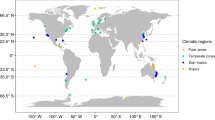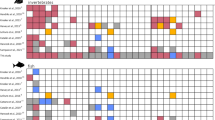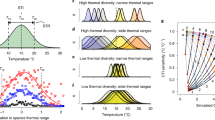Abstract
Past meta-analyses of the response of marine organisms to climate change have examined a limited range of locations1,2, taxonomic groups2,3,4 and/or biological responses5,6. This has precluded a robust overview of the effect of climate change in the global ocean. Here, we synthesized all available studies of the consistency of marine ecological observations with expectations under climate change. This yielded a meta-database of 1,735 marine biological responses for which either regional or global climate change was considered as a driver. Included were instances of marine taxa responding as expected, in a manner inconsistent with expectations, and taxa demonstrating no response. From this database, 81–83% of all observations for distribution, phenology, community composition, abundance, demography and calcification across taxa and ocean basins were consistent with the expected impacts of climate change. Of the species responding to climate change, rates of distribution shifts were, on average, consistent with those required to track ocean surface temperature changes. Conversely, we did not find a relationship between regional shifts in spring phenology and the seasonality of temperature. Rates of observed shifts in species’ distributions and phenology are comparable to, or greater, than those for terrestrial systems.
This is a preview of subscription content, access via your institution
Access options
Subscribe to this journal
Receive 12 print issues and online access
$209.00 per year
only $17.42 per issue
Buy this article
- Purchase on Springer Link
- Instant access to full article PDF
Prices may be subject to local taxes which are calculated during checkout




Similar content being viewed by others
References
Tasker, M. L. The Effect of Climate Change on the Distribution And Abundance of Marine Species in the OSPAR Maritime Area ICES Coop. Res. Rep. No. 293 (International Council for the Exploration of the Sea, 2008).
Chen, I. C., Hill, J. K., Ohlemuller, R., Roy, D. B. & Thomas, C. D. Rapid range shifts of species associated with high levels of climate warming. Science 333, 1024–1026 (2011).
Root, T. L. et al. Fingerprints of global warming on wild animals and plants. Nature 421, 57–60 (2003).
Rosenzweig, C. et al. Attributing physical and biological impacts to anthropogenic climate change. Nature 453, 353–358 (2008).
Przeslawski, R., Falkner, I., Ashcroft, M. B. & Hutchings, P. Using rigorous selection criteria to investigate marine range shifts. Estuar. Coast. Shelf Sci. 113, 205–212 (2012).
Sorte, C. J. B., Williams, S. L. & Carlton, J. T. Marine range shifts and species introductions: Comparative spread rates and community impacts. Glob. Ecol. Biogeogr. 19, 303–316 (2010).
IPCC Climate Change 2007: Impacts, Adaptation and Vulnerability (eds Parry, M. L., Canziani, O. F., Palutikof, J. P., van der Linden, P. J. & Hanson, C. E.) (Cambridge Univ. Press, 2007).
Burrows, M. T. et al. The pace of shifting climate in marine and terrestrial ecosystems. Science 334, 652–655 (2011).
Hoegh-Guldberg, O. & Bruno, J. F. The impact of climate change on the World’s marine ecosystems. Science 328, 1523–1528 (2010).
Doney, S. C. et al. Climate change impacts on marine ecosystems. Ann. Rev. Mar. Sci. 4, 11–37 (2012).
Parmesan, C. & Yohe, G. A globally coherent fingerprint of climate change impacts across natural systems. Nature 421, 37–42 (2003).
Parmesan, C. Influences of species, latitudes and methodologies on estimates of phenological response to global warming. Glob. Change Biol. 13, 1860–1872 (2007).
Sunday, J. M., Bates, A. E. & Dulvy, N. K. Thermal tolerance and the global redistribution of animals. Nature Clim. Change 2, 686–690 (2012).
Loarie, S. R. et al. The velocity of climate change. Nature 462, 1052–1055 (2009).
Van der Wal, J. et al. Focus on poleward shifts in species’ distributions underestimates the fingerprint of climate change. Nature Clim. Change 3, 239–243 (2012).
Parmesan, C. et al. Beyond climate change attribution in conservation and ecological research. Ecol. Lett. 16, 58–71 (2013).
Devictor, V. et al. Differences in the climate debts of birds and butterflies at a continental scale. Nature Clim. Change 2, 121–124 (2012).
Mueter, F. J. & Litzow, M. A. Sea ice retreat alters the biogeography of the Bering Sea continental shelf. Ecol. Appl. 18, 309–320 (2008).
Beaugrand, G. Decadal changes in climate and ecosystems in the North Atlantic Ocean and adjacent seas. Deep-Sea Res. II 56, 656–673 (2009).
Wolkovich, E. M. et al. Warming experiments underpredict plant phenological responses to climate change. Nature 485, 494–497 (2012).
Edwards, M. & Richardson, A. J. Impact of climate change on marine pelagic phenology and trophic mismatch. Nature 430, 881–884 (2004).
Pau, S. et al. Predicting phenology by integrating ecology, evolution and climate science. Glob. Change Biol. 17, 3633–3643 (2011).
Sapiano, M. R. P., Brown, C. W., Schollaert, Uz, S. & Vargas, M. Establishing a global climatology of marine phytoplankton phenological characteristics. J. Geophys. Res. 117, C08026 (2012).
Parmesan, C., Duarte, C., Poloczanska, E., Richardson, A. J. & Singer, M. C. Overstretching attribution. Nature Clim. Change 1, 2–4 (2011).
Levitus, S. et al. Global ocean heat content 1955-2008 in light of recently revealed instrumentation problems. Geophys. Res. Lett. 36, L07608 (2009).
Barnett, T. P. et al. Penetration of human-induced warming into the world’s oceans. Science 309, 284–287 (2005).
Ling, S. D. & Johnson, C. R. Population dynamics of an ecologically important range-extender: Kelp beds versus sea urchin barrens. Mar. Ecol. Prog. Ser. 374, 113–125 (2009).
Acknowledgements
This work was conducted as a part of the Understanding Marine Biological Impacts of Climate Change Working Group supported by the National Center for Ecological Analysis and Synthesis, a centre funded by NSF (Grant #EF-0553768), the University of California, Santa Barbara, and the State of California.
Author information
Authors and Affiliations
Contributions
E.S.P. and A.J.R. led the NCEAS working group. E.S.P., A.J.R., C.J.B., P.J.M., S.A.T. and W.J.S. extracted data from publications for the database. E.S.P., A.J.R. and C.B. undertook quality-control of the database. E.S.P., C.P. and W.J.S. wrote the first draft of the paper. W.K., C.J.B., A.J.R., M.T.B., E.S.P. and D.S.S. ran analyses and produced figures and tables. All authors contributed equally to discussion of ideas, development of the database and analyses, and commented on the manuscript.
Corresponding authors
Ethics declarations
Competing interests
The authors declare no competing financial interests.
Supplementary information
Rights and permissions
About this article
Cite this article
Poloczanska, E., Brown, C., Sydeman, W. et al. Global imprint of climate change on marine life. Nature Clim Change 3, 919–925 (2013). https://doi.org/10.1038/nclimate1958
Received:
Accepted:
Published:
Issue Date:
DOI: https://doi.org/10.1038/nclimate1958
This article is cited by
-
Beyond boundaries: governance considerations for climate-driven habitat shifts of highly migratory marine species across jurisdictions
npj Ocean Sustainability (2024)
-
Speed of environmental change frames relative ecological risk in climate change and climate intervention scenarios
Nature Communications (2024)
-
Otolith biochronology for the long-term reconstruction of growth and stock dynamics of fish
Reviews in Fish Biology and Fisheries (2024)
-
The Genomic Ghosts of Geukensia granosissima
Estuaries and Coasts (2024)
-
Warming, not acidification, favours survival of non-indigenous over native gammarid species
Biological Invasions (2024)



